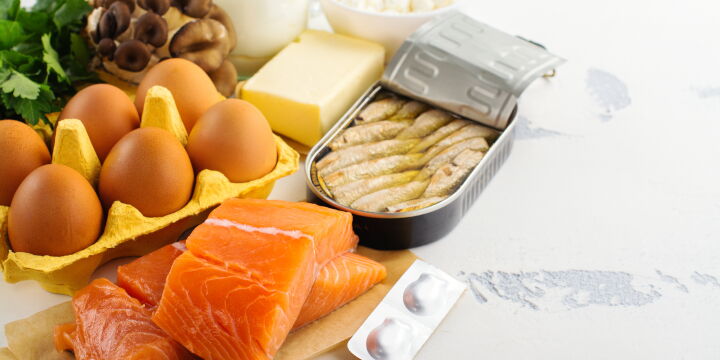Training and performance are certainly important for our physical and mental ascent but the diet affects the remaining factors: sensations, well-being, health, energy.
While one can do without physical activity by following a good diet; it is unthinkable to be able to do the opposite.
To have a good physical (and mental) shape, those who practice sports know they must follow a healthy, balanced and nutritious diet, rich in vitamins and minerals: essential elements that should never be missing.

It was the Polish doctor Kazimierz Funk who, in 1911, extracted from the bran a substance (amine) able to cure beriberi: since then the word amine of life or vitamins
A healthy and balanced diet, rich in fruit and vegetables, is already a good way to ensure the body the right amounts of vitamins that are necessary to reach a state of health that can be considered optimal.
However, especially in the modern era, some shortcomings have appeared that are linked to certain specific factors.
The foods we bring to our tables have lost many of their original characteristics, consequently lowering the bar of the percentage of vitamins present in them.
Among the causes we can mention prolonged exposure to light and air, treatments, cooking at high temperatures.
Vitamin deficiency defined as hypovitaminosis (vitamin present in insufficient quantities in the body) and avitaminosis (total absence) present specific symptoms depending on the type of missing vitamin and can cause various disorders or lead to defined diseases.
What are the vitamins of the athlete not to miss?
In sports there are vitamins that are the basis for optimizing the work done during a training session.
Vitamin D, those of group B, vitamins C, A and E are those considered necessary in sport: they must be present so that other substances can perform their multiple functions in an optimal way.
They are like the joints of the pieces of a puzzle that allow the assembly and completion of the same
Let's see them closely
Vitamin D
Important for the health of muscles, bones, nerves, teeth and for all hormonal functions.
A great help for the immune system, it works to keep it efficient and healthy.
It stimulates the production of endorphins (serotonin and dopamine) hormones that improve depression and is also necessary for a good growth of children, as, without it, bones and teeth do not calcify well.

For all these effects, vitamin D plays a well-defined and important role for our health and its deficiency should never be underestimated.
Already in the fall; period in which it begins to run out due to the lack of exposure to the sun, its integration is almost essential especially because, being a support to our immune system, it helps us to defend ourselves from seasonal diseases.
Vitamins of group B
They perform one of the most important functions: to intervene in metabolic processes by transforming carbohydrates, fats and proteins into ready-to-use energy.
We find them in foods such as meat and milk, cereals, potatoes and green leafy vegetables while vitamin B12 is found exclusively in products of animal origin: chicken, eggs, fish and milk.

Taking foods with vitamin B brings with it a whole series of benefits for our organism.
The B vitamins are essential, in fact, for the immune system and also lead to a reduction in tiredness and fatigue (B6 and B12).
Also fundamental for the well-being of the brain and nervous system (B12), they are also able to act on the mood level by regulating any stressful situations.

Furthermore, vitamins B1, B2 and B3 are essential for energy metabolism, B8 for the health of hair and skin, vitamin B9 (folic acid) for pregnant women as it favors the development of the embryo and determines its protection.
C vitamin
Powerful antioxidant, it works to strengthen the immune system and is useful in sports, as it is able to counteract the oxidative stress of the muscles.
It promotes healthy circulation and also helps to absorb iron.

This vitamin is necessary for the production of collagen the fibrous protein necessary for the structural integrity, strength and elasticity of the connective tissue.
Vitamin A
Valid help for cell growth and to keep tissues intact; it works for an efficient immune system and is known to most as retinol.
Vitamin A can be found in egg yolk, whole milk and ghee butter.

Try my breakfast biscuits: are rich in vitamin A and vitamins of group b
Vitamin A can also be converted in our body from beta-carotene with an antioxidant action.
Did you know that?
The lack of vitamin A "do you feel it on the skin ?!"
In fact, when its levels are low, the skin looks dull, yellow, and dry.

Vitamin A is essential for the well-being of the skin as it regulates the elasticity of the cells, protecting them from the attack of harmful elements.
A skin rich in vitamin A is in fact visibly softer, smoother, younger and more elastic.
Vitamin E
Powerful antioxidant and, therefore, useful in protecting against free radical damage.
It regulates blood coagulation by intervening in tissue repair processes.
We find it in green leafy vegetables, nuts, cereals and corn oil.
A tip for those who dedicate themselves to sport in an intense way can be to introduce all the foods listed following a balanced and varied diet and where nutrition does not arrive, integrate with quality products to maintain a vitamin concentration that brings balance and total well-being to your body.
